May 2015
Awed to Heaven, Rooted in Earth
12/05/15 18:15
Walter Brueggemann, Awed to Heaven, Rooted in Earth: Prayers of Water Brueggemann, (Minneapolis: Fortress Press), 2003.
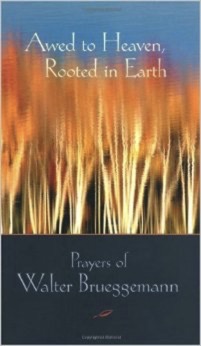
I purchased this volume, which I had not previously owned, as a companion to a book study group who were looking through "Sabbath as Resistance." I felt that our devotions should reflect some of the intentional devotional life of our author. I am not disappointed. Edwin Search has done a wonderful job of collecting and editing this volume so that the prayers are easily accessible. The scriptural index makes it easy to access the prayers and some are arranged by the season of the year as well.
Anyone who prays in public should find this book inspirational and useful. I know I'll be returning to it again and again in the years to come.
Body Talk Access
12/05/15 13:28
John Veltheim, Body Talk Access: A New Path to Family and Community Health, (Sarasota, FL: PaRama LLC), 2008.

The point of the book is that Body Talk is a healing system that is so simple to practice that anyone can quickly learn the techniques and that the application of the techniques will have instant and life-altering results. It is clear from the stories told in the book that there are people who believe that their lives have been dramatically changed by the techniques of Body Talk. It is less clear that there is a cause and effect relationship between the practices and the outcomes.
As a skeptic, I am trying to remain open and to continue to study the Body Talk Access approach. I don't mean to be overly dismissive, but I am not overly impressed either. This particular book is little more than a promotion piece, touting the effects of the practice and selling it to those with money to invest in training.
Body Talk Access Training Manual
12/05/15 11:34
Sylvia Muiznieks and John Veltheim, Body Talk Access Training Manual, (Sarasota, FL: PaRama LLC), 2007.
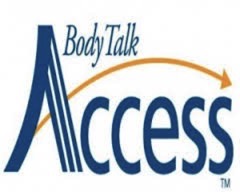
The International Body Talk Association calls those who complete the one-day training "Technicians." Each step of the system is taught both as a practice for self and something that can be offered to others for relaxation, healing and integration.
I remain one of the skeptics. My way of thinking is different from that of the proponents of Body Talk. On the other hand, it is easy to agree with the assertion that it does no harm to engage in the Body Talk practices. As a response to the class, I have taken the Body Talk challenge to engage in Body Talk practices daily for 30 days. As I write i'm about half way through those 30 days, so it is simply too early for me to judge the effectiveness of the practice. At this point I'm not ready to begin practicing Body Talk on others, but I can see some value of concentrating on one's own body as a path to meditation. Breath prayers and breath-focused meditation have a long and deep tradition in the history of spirituality.
As I took the class, I also obtained two additional books on Body Talk which I will read and review as well.
The Church of Disunity
12/05/15 11:24
Ryan Schendzielos, The Church of Disunity, (Rapid City, SD: Shelter 50 Publishing), 2015.
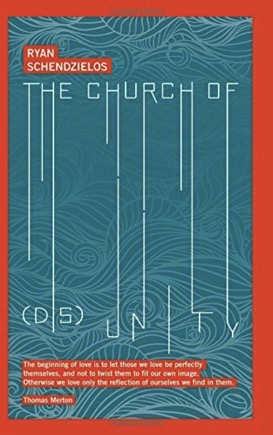
In this small book he is very accurate at naming some of the challenges faced by the contemporary church. We have striven too much for sameness, agreement, and common belief when it is the nature of our faith to be complex and multi-faceted. The contemporary church (and perhaps the church in many different generations) has tended to be a collection of people who are very similar discussing mostly what they share in common. Ryan dares to envision a church that can live in harmony without striving for unity - for being the same.
Like the rest of us, Ryan is perhaps more effective at diagnosing the problems and less effective in his "solutions." Still, there are some suggestions that are meaningful, even if they have been tried. His recommendations, understandably, are most applicable to the small-sized congregation that he served and would need to be adapted for larger and more entrenched congregations. Still, he seems to have a good grasp on the directions of the emerging church and I suspect, the church of the future may conform more to his vision than to the traditional structures that we now see.
Invasion of the Dead
12/05/15 11:14
Brian K. Blount, Invasion of the Dead: Preaching Resurrection , (Louisville, KY: Westminster John Knox Press), 2014.
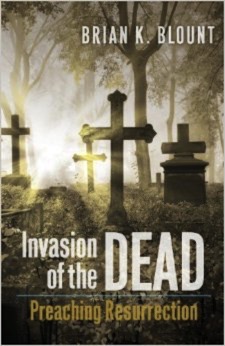 It is a bit of a "catchy" title, playing on the death-obsession of much of popular culture, and the book takes a bit of a popularized view of its subject matter. Still there are a few challenging ideas that should be challenging especially to some of the evangelical preachers who have received plenty of media attention. Looking closely at the Gospel of Mark and the Book of Revelation, Blount explores the deepest mystery and powerful claim of the Christian church: Death is not the end - Jesus' death is not the final word on the meaning, the power, and the depth of God's love.
It is a bit of a "catchy" title, playing on the death-obsession of much of popular culture, and the book takes a bit of a popularized view of its subject matter. Still there are a few challenging ideas that should be challenging especially to some of the evangelical preachers who have received plenty of media attention. Looking closely at the Gospel of Mark and the Book of Revelation, Blount explores the deepest mystery and powerful claim of the Christian church: Death is not the end - Jesus' death is not the final word on the meaning, the power, and the depth of God's love.
Offering resurrection theology as an alternative theology to apocalypticism, Blount concludes his book with three sermons to illustrate how this might be preached in contemporary churches. These aren't sermons that would work for me or for the congregation I serve, but they are interesting nonetheless.
This isn't the ground-breaking work that its cover notes claim, nor is it a book that will invite me to read again and again, but it is a reasonable conversation starter and a volume that might offer an alternative way of thinking to those who haven't spent much time studying the apocalyptic moments in the history of Judaism and Christianity.
If you want to read it, I've got a used copy I'd be glad to share.

Offering resurrection theology as an alternative theology to apocalypticism, Blount concludes his book with three sermons to illustrate how this might be preached in contemporary churches. These aren't sermons that would work for me or for the congregation I serve, but they are interesting nonetheless.
This isn't the ground-breaking work that its cover notes claim, nor is it a book that will invite me to read again and again, but it is a reasonable conversation starter and a volume that might offer an alternative way of thinking to those who haven't spent much time studying the apocalyptic moments in the history of Judaism and Christianity.
If you want to read it, I've got a used copy I'd be glad to share.
Touched by Suicide
12/05/15 11:05
Michael Myers and Carla Fine, Touched by Suicide: Hope and Healing after Loss, (New York: Gotham Books), 2006.
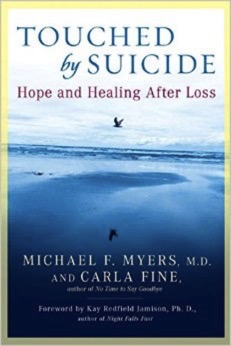
As a first responder to death by suicide in our town, I often find myself providing resources for those who are swept up in the grief of a sudden and traumatic loss along with the stigma attached to mental illness and the lack of societal understanding of the nature and effects of suicide. For those who seek meaning from reading, this book is an excellent resource. I assume that my copy of the book will be given away and replaced multiple times in my life.
This is a well-researched book with an excellent bibliography. It is a must-read for those whose lives are affected by suicide - and these days that is a lot of us.
Sabbath as Resistance
12/05/15 10:48
Walter Brueggemann, Sabbath as Resistance: Saying No to the Culture of Now, (Louisville, KY: Westminster, John Knox Press), 2014.
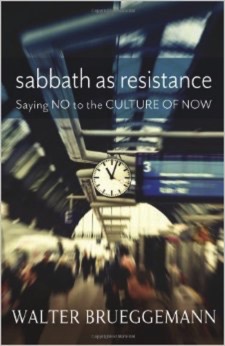
I have heard Brueggemann speak about Sabbath in other contexts. In this short study, he brings together several themes that have arisen in other contexts. The book would be excellent for a lay study group as well as for conversations between clergy and church leaders. In a world where discussions of Old Testament laws are often legalistic and moralistic, Brueggemann's approach is refreshing. He doesn't approach covenant obligations as a list of mandatory compliances, but rather as a challenge to the status quo. Our 24/7 society of consumption with its pressures for ever more growth, more money, more knowledge - stands in stark contrast to the liberation offered to God's covenant people. Brueggemann offers a peek at a different way to live - the way promised not only by the God of the Old Testament covenant, but also the God of Jesus who calls us to a new and different way of living.
Conjectures of a Guilty Bystander
12/05/15 10:39
Thomas Merton, Conjectures of a Guilty Bystander, (New York: Random House), 1965
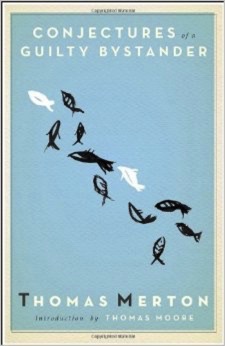
It is the theology that inspires me. Thinking about God in new ways - pursuing the relationship that pursues the believer.
Having recently read several deconstructionist theologies, Merton is a refreshing read for a person of faith. Merton at once assumes God's presence and goodness, while being totally unthreatened by the questions and concerns that have been raised by those who criticize the institutional church and some of its doctrines. He lives and has his being within the church and yet is unperturbed by those who question it.
Merton's gift for language and writing serves him well in this book. It is a book to read slowly and savor - and a book to which one will want to return again and again.